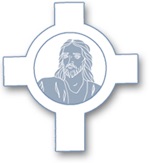Constancy Forms Pathway
Consistent sowing forms the Path of the Way—Haphazard actions create destruction.
Constancy within your pathway yields good results by first building a solid foundation. Constancy, or consistency, is a well-known historical principle for success, whether applied to business, spiritual development, or personal matters. Consistent application reduces burdensome thinking, for you have accomplished all that can be done that day. Constancy reduces grasping for intellectual solutions not wedded to wisdom (spirit). We will see this lack of constancy demonstrated in the story of Ahaz.
Consistency in sowing helps remove personal burdens, for instance. The mind that must receive the vision becomes directed toward the spirit within, instead of the configuring and often erratic intellect. Remember, Sowing Good Seed is not so much a discipline, and should not be seen as tasking, it is a practice. For some people, this may mean two or three days of good sowing per week, which might take five or ten minutes per session. For others, they may choose to practice more often. As we investigate Ahaz we find his choice of pathway is ill-conceived, he is not well-prepared, and his lack of constancy delivers Judea into hazard.
For Ahaz, and being youthfully rash, he lacks any serious intent toward God, duty, or wisdom, and certainly has no attribution but to the ritual of himself and his pagan practices. The following story of Isaiah and Ahaz illustrates the lesson of separation (split apart) instead of a unified pathway. It is not proposed specifically because it is in the Bible, but because the lessons learned concerning Ahaz are hard and fast, and the same type of result lingers in the lives of many people. Judah becomes a vassal state, paying tribute (attribution) to a foreign power that has essentially occupied their land.
*
ISAIAH The PROPHET & AHAZ The Evil King of Judah 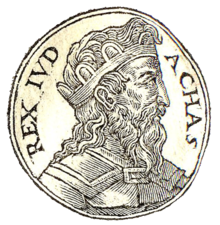

The powerful Assyrian empire continued to expand. Syria (Damascus) and Israel formed an alliance to confront the Assyrians and wished Ahaz to join them. When Ahaz refused, the allied kingdoms attacked Ahaz in an attempt to replace him. In response, Ahaz seeks unity with Assyria.* Isiah the Prophet warns Ahaz to avoid entangling alliances with Assyria (heathen nations) (Isaiah 7.10-16). He encourages Ahaz to rely on Jehovah and listen to His voice, to receive good guidance. Ahaz puts aside Isaiah’s advice. Instead, he beckons Tiglath-Pileser, king of Assyria, into an agreement that essentially turns Judea into a vassal state under the powerful Assyrian Empire.
*The Assyrian war lasted from 734-732 BCE, Jewish Encyclopedia.
2Kgs. 16.1-10: (Ahaz 735-720 BC)
(1) In the seventeenth year of Pecha the son of Remaliah Ahaz the son of Jotham king of Judah began to reign.
(2) Twenty years old was Ahaz when he began to reign, and reigned sixteen years in Jerusalem, and did not that which was right in the sight of the Lord his God, like David [House of David] his father.
(3) But he walked in the way of the kings of Israel,* yea, and made his son to pass through the fire,** according to the abominations of the heathens [heathens=heathen nations], whom the Lord cast out from the children of Israel.
*Israel consistently had problems with syncretism. Surrounded by pagan nations, their location was in part the reason. See Gideon.
**sacrificed his first-born son.
(4) And he sacrificed and burnt incense in the high places, and on the hills, and under every green tree [established paganism across the land].
(5) Then Rezin king of Syria and Pekah [also] son of Remaliah came up to Jerusalem to make war: and they besieged Ahaz,* but could not overcome him.
*Numbers are put at 100,000 dead in the Kingdom of Judah.
(6) At that time Rezin king of Syria recovered Elath to Syria, and dragged the Jews from Elath: and the Syrians [Syrian people] came to Elath, and dwelt there unto this day.
(7) So Ahaz sent messengers to Tiglath-Pileser king of Assyria, saying, ‘I am thy servant and thy son: come up and save me out of the hand of the king of Syria, and out of the hand of the king of Israel, which rise up against me.
(8) And Ahaz took the silver and gold that was found in the house of the Lord, and in the treasure of the king’s house, and sent it for a present to the king of Assyria.
(9) And the king of Assyria hearkened unto him: for the king of Assyria went up against Damascus, and took it, and carried the people of it captive to Kir, and slew Rezin.
(10) And king Ahaz went to Damascus to meet Tiglath-Pileser king of Assyria, and saw the altar that was at Damascus.
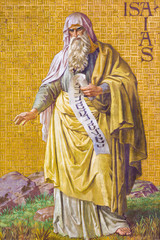 Isaiah 7.11-16: Moreover the Lord spoke again to Ahaz, saying (11) “Ask thee a sign of the Lord thy God; ask it either in the depth, or in the height above.
Isaiah 7.11-16: Moreover the Lord spoke again to Ahaz, saying (11) “Ask thee a sign of the Lord thy God; ask it either in the depth, or in the height above.
(12) But Ahaz said, “I will not ask, neither will I tempt [go to] the Lord.” Ahaz had already decided to appeal to Assyria and had probably already sent messengers to Tiglath-Pileser.
(13) And he said, “Hear ye now, O house of David; Is it a small thing for you to weary men, but will ye weary my God also?
(14) Therefore the Lord Himself shall give you a sign; Behold, a virgin* shall [future tense] conceive, and bear a son, and shall call his name Immanuel [=God with us].
*Also, ‘young woman’ (almah), or might infer virgin (bethulah), however, almah is this interpretation, see Complete Jewish Study Bible. Orthodox Christian: “As a sign to Ahaz this damsel was an Almah. As a sign, when the prophecy was fulfilled (or filled full), it was Mary, [interpreted as] the parthenos or virgin,” from Kegel notes, Companion Bible, Kegel Publications, 1990.
(15) Butter [=curds] and honey shall he eat, that he may know to refuse evil, and choose the good. (16) For before that child shall know to refuse the evil, and choose the good*, the land that thou abhorrest shall be forsaken of both her kings.”
*See, Mt. 4.1-11. The temptations of Jesus by Satan begin with a lesser sin, which is to break his fast. This is similar to the temptation offered to Eve in the garden, a kind of introduction to waywardness, symbolized by bread, but in no way a venal sin. The second offering is to tempt fate, “and in their hands they shall bear thee up,” but this is also rejected; and third, “kingdoms of the world” are offered, or power. Again, much like the temptation provided for Eve, the power to be like God (of which Adam and Eve were already in that image), and status. Also, Lk. 4.1-13.
Comment: Ahaz does not listen to Isaiah the Prophet nor seek God. For a Judean, this is a break from any kind of normal practice. No one knows exactly why Ahaz follows after his pagan neighbors. Perhaps he perceives Assyria as strong, and powerful, and thus their gods must somehow be superior. Many people see worldly standards in the same manner and run after the purely physical values that often consume them, with little or no spiritual consideration. Ahaz seems to follow this blueprint.
The lesson: do not weary the spirit of God by inaction; do not separate yourself from the prophetic voice. The spirit of God within and without awaits Ahaz’s participation, but Ahaz has no such inclinations. As a youth can be, his strong-headed views are his own, and these views possess him; do not let your views possess you, for you will become a vassal to them—seek the spirit before making important decisions.
As most know, verse 14 is prophetic to the Anointed One, meaning the coming Messiah. This scripture links to v.16, for it is prophetic and directed toward Judah, which for Ahaz is a prompt to choose the good, and taken in context serves two purposes: first, that a messiah had already been promised to Israel and Judah, which indicates to Ahaz his pagan worship is severely misdirected; and second, this being so, is not meant solely as a prophecy concerning Messiah, but in contrast given as a warning as to consequences should Ahaz not heed this advice.
However, even this chastizement does not avert Ahaz from his ill-conceived pathway. Verse 15 deals with recognizing good and evil and the proper choice, using Messiah (not yet revealed) as an example. Ahaz has no perception or impetus toward good efforts or solutions; he is obstinate, unhearing, and bound and determined to proceed in what will become his destructive way, pursued without wisdom nor taking counsel.
Let us analyze the actions of Ahaz, and not so much from a religious view or purely biblical study, but from the principled and spiritual heart of the matter. Ahaz first disavows himself of sound counsel (Isaiah) and also does not perceive possible consequences, even though he has been warned. He remains in denial, perhaps unbelief, and sticks with his pagan worldly ways, both in thought and in practice. Essentially, Ahaz gives away what power he has to unknown future consequences, which when begun he will have no control over. He panics and does not embrace the power he already possesses.
Second, he offers up his stored wealth, both in decision-making and in the physical—he sends gold and silver, his treasure trove, and he expends his treasure. He offers it willingly, and in doing so, dumps his problem upon someone else. He relieves himself of the further necessity to make any more important decisions, all actions are primarily left to Tiglath-Pileser. In a certain sense, even considered within his thinking process, at the moment he weakens himself. He neither seeks nor accepts guidance nor wisdom; he ends by making a rash decision. He inserts typical worldly standards but does not explore Godly standards first.
Third, he initiates vast forces that begin to course across the landscape of circumstance—foreign cohorts will march across the land. Assyrian war drums will now take the place of a wiser consideration. Nor can he presume real outcomes, for he has unleashed wide-ranging forces over which he has no control.
Fourth, it is, in fact, Assyria who gains the victory, not Ahaz, and at the same time, the coffers of Ahaz have become impoverished. Damascus falls. Captives, later to become enslaved, are not the booty of Ahaz, but Tiglath. Rulers are slain (Rezin), which will produce a long-standing Syrian enmity (enemy) toward Judea (self), and yet the lands of Assyria remain distant and unthreatened.
Fifth, a new altar is built with the gold Ahaz has sent, which gives obeisance to a new power, a power that is without the God of Judea. What great burdens now await Judea (you)?
Many of us move through life in much the manner of Ahaz. We do not first look to the spirit, sow seed, nor offer considered prayer, and in the doing, we leave our strength behind. The kingdom within cannot guide or assist us. We seem unable to receive sound advice but will rush to a solution that will naturally absolve us of our power as a Child of God. We turn toward the world and worldly solutions (fixes), but with no resolution point in sight, sacrificing all for the immediate panic.
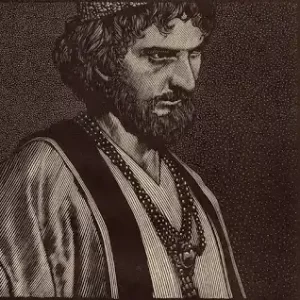
How many of us have run from friend to friend and seek advice on the circumstances confronting us? Yet, the same person who seeks out others may take little time to inspect first what they already have and rally their inner forces accordingly. They do not look within; the consistency of their pathway they have not attended. For this reason, unneeded burdens gather around this lack of effort, whether to show its face sooner or later, as Ahaz discovers. Without constancy on pathway, we instead throw ourselves into the first-worldly solution and spend our time grieving later, and grieve we will. Ahaz’s worldly method can become a bad habit in thinking and doing. True resolution and sound results continue to elude us. Many of us have fallen into this trap. This lack of consistency on the pathway and the burdens that go with it do not represent the Path of the Way.
There are many lessons contained within the story of Isaiah and Ahaze. Isaiah is the wise counselor, in part representing the spirit within—go to Him first. Stay long enough with that counsel so the real problem is outlined—clarity yields great benefits. Do not squander your spiritual wealth—spiritual wealth is between yourself and God or the chosen few you may counsel with. Rash decisions can unleash unwanted circumstances—assume humility during stressful seasons, thus receiving your guidance instead of grasping. Victory can never truly be yours unless it is you who asserts it. Ahaz lacks clarity, he lacks a certain kind of responsibility, and his decisions become reckless. Ahaz has no victory.
*
Take responsibility for your life and your pathway. Consequences may far outlast your original intent and purpose—be wary of what you attribute in this world. Without care, much like Ahaz and Judah, your mind will become an occupied land, never quite your own but always subject to foreign intervention with payments of loyalty and attribution (tribute). Consistency (constancy) is your friend and can remove many current and future burdens.
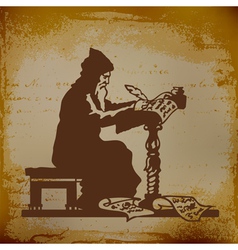
God Bless!
